Project Introduction and Objectives
For our LFS 350 community-based project, our team has been tasked with working on the Vancouver Food Asset Map in collaboration with Vancouver Coastal Health (VCH) and Vancouver Neighbourhood Food Networks (VNFN). The VNFN (2016) provides a network for the community to collaborate on community based food initiatives and programs to advocate for food justice. The food asset map is an online and interactive tool to provide community members with easily accessible information of the food assets we have in our community. In particular, our group will be mapping kitchen access throughout the city— allowing community members with or without kitchens, the proper means to prepare healthy and delicious food. Additionally, we will be working within the community to assess the functionality of map, and testing its usefulness as a resource to promote food security in the Vancouver area. The project has a goal to build the capacity of communities through promoting food justice by paving the way to equal access to good food for everyone in the community.
Meet the Team!
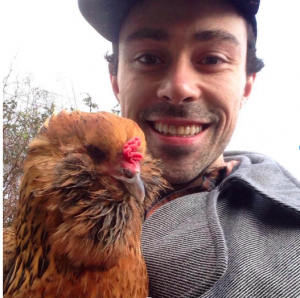 Ilan Wright| 3rd Year Dietetics
Ilan Wright| 3rd Year Dietetics
Interests: I have a deep passion for food that trickles into many aspects of my life. As a Red Seal chef, I have cooked for over a decade in an array of environments. I love to get my hands dirty and volunteer on farms, and tend to my own garden. I enjoy working in the community lending a hand wherever I’m needed such as schools, or health care settings.
Reason for Choosing this Project: I want to get to know what resources are available to the public pertaining to kitchen access. I know that for many low-income citizens, their living situation does not meet their needs in order to prepare food adequately. Through my experiences in LFS 350, I wish to gain a better understanding of the complexity of our food system. I hope to unravel the challenges we face, and to gain insight into what approaches are working to navigate them. One thing I especially look forward to is the opportunity to connect directly with the community, something I believe should be a mainstay in education.
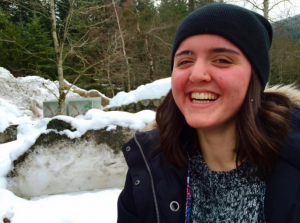
Taylor Sacré | 3rd Year Global Resource Systems
Interests: I have had a passion for food ever since I can remember, as I spent my childhood baking, cooking and playing in the kitchen with my mom and grandmother. I also have a passion for healthy living & wellness and can often be found in the mountains, in the community, dancing or in a kitchen.
Reason for choosing this project: I believe that cooking, preparing and having a good relationship with food is an essential component to building a healthy lifestyle and a strong community. People bond and build relationships over food, but some members of the Vancouver community are without the means to adequately prepare their food. I am currently unaware of any kitchen access programs in Vancouver, and am looking forward to diving further into this potentially overlooked aspect of our local food system. From this experience, I hope to gain a deeper knowledge of the Vancouver food system, and gain insight into different food security issues and programs in the community. Additionally, my goal is to make a meaningful and useful contribution to the food asset accessibility of Vancouver.
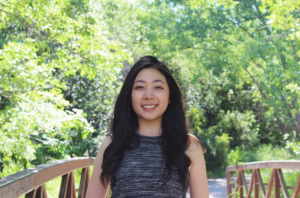
Joy Wong | 3rd Year Food, Nutrition, and Health
Interests: I have a passion for learning and self-growth. Currently, my interest focuses on nutrition and how food plays a role in our health and wellbeing. I love to help others and have always envisioned myself working in a healthcare environment. I enjoy teaching and educating children about the importance of healthy eating.
Reason for choosing this project: I chose this project because I believe that identifying the assets we have in the community, such as kitchen access, is a very valuable resource to increase food literacy among individuals while simultaneously strengthening communities. By pinpointing the locations of accessible kitchens in the Vancouver area, we can gain a better understanding of the availability and accessibility of what our community has to offer in terms of securing food security. My goal is to identify food assets in my community and learn about the strengths and weaknesses of these initiatives and thus further my understanding of Vancouver’s food system. Through experiential learning in LFS 350, I wish to appreciate the value of working in the community and working with a diverse group of students to build on my previous knowledge of food systems and create a more solidified understanding.
Ca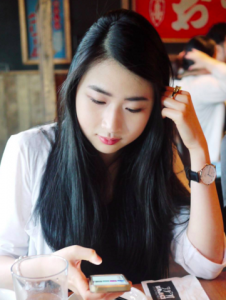 rmen Chan | 3rd Year Food, Nutrition, and Health
rmen Chan | 3rd Year Food, Nutrition, and Health
Interests: My passion for nutrition was born out of my infatuation with good food and desire to eat healthy. Eating food that you know is good for you makes you feel good from the inside out. Natural ingredients tastes best in their purest form, so everything I cook is wholesome and has a nutritional purpose. But healthy food doesn’t mean it has to taste bad!
Reason for choosing this project: After taking LFS250 last year I learned that food literacy is vital part of being food secure. Just because you’re wealthy it does not mean you are food secure, and because you are poor it doesn’t mean you’re not food secure. Many people who should be “food secure” by definition are not because they lack the knowledge, skills, or time to do so. I hope that through working with like-minded individuals on this project, we will be able to help connect with the community and awaken their love for real food like I have.
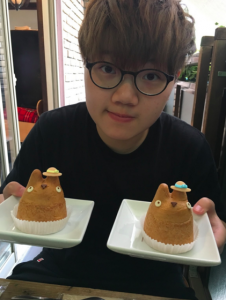
Sze Yiu Li (Yoyo) | 3rd year Food Market Analysis
Interests: I enjoy any activity about food. My interest is to explore the combination of visual art and food. I am always looking forward to learn more skills of food. In last summer, I took a barista course to learn how to make beverages. In my spare time, I try to make new dishes by following YouTube channels, but usually decorate them with my own creativity. I hope that I can have my own restaurant someday.
Reason for choosing this project: As an international student, I would like to connect with Vancouver’s local community and find out more details about the local food system. The reason why I choose this project is because I want to contribute to the society by providing useful information on where people could access healthy and affordable food. My goal is to collect valuable data in order to make the food assets map more user-friendly. I hope that I can improve my public communication skills after working with the community organization.
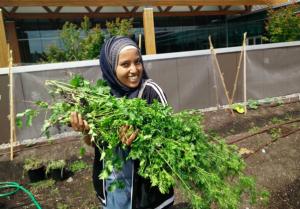 Raihan Hassen | 3rd year Food, Nutrition, and Health
Raihan Hassen | 3rd year Food, Nutrition, and Health
Interests: I am passionate about building communities and relationships with people beyond my scope. I enjoy gardening and cooking. Growing up in the Vancouver area, I have had the privilege of encountering many cultures. I enjoy learning about cultural foods and how food is perceived by people with different backgrounds. I like collaborating with others to discuss the pathways of attaining healthy and sustainable lifestyles.
Reason for choosing the project: I chose this project because it motivates me to consider the assets that are available in Vancouver. I would like to be more aware of the kitchen access that are available for public use. This information can be useful for those who wish to express their cooking skills but don’t typically have access to kitchen facilities. Moreover, community kitchens facilitate community building and are an avenue through which food literacy can be gained. I chose this project because it would contribute to my own learning and the food asset map will hopefully be used by individuals in the future. My goal for this project is to create a user-friendly food asset map that will be used by community members. I hope to gain an appreciation for the factors that influence food choices made by those living in the lower-income region of Vancouver. Through this project, I wish to gain a more holistic idea of the Vancouver food system. I would like to gain knowledge so that i can pass the information on to community members and stakeholders alike.
First Impressions
We are excited to be to be collaborating with Vancouver Coastal Health, and the Vancouver Neighbourhood Food Network partners to to develop this tool to help food security in Vancouver. Going into our first meeting, we were unsure of what to expect. We knew we would be tasked with mapping the kitchen access programs in Vancouver, as well as working with the community, but we were unsure of what the process would be like or how our project fit into the bigger picture. Our first impression was that the project will require meticulous detail and accuracy. We will need to be incredibly diligent with our organization and data implementation. We did not quite understand the scope of the Vancouver food map, and were impressed with it’s complexity. This map has the potential to positively impact a multitude of community members, spanning all of the city of Vancouver. By creating these maps, we are giving community members the knowledge to engage in its own success and growth. Ernesto Sirolli (2012) would agree that we must respect what is already in the community and help out by enhancing what already exists, instead of bringing in new resources into the community. Mathie and Cunningham (2003) state that asset-based community development is about encouraging communities to take charge. To help communities, we must build an inventory of the assets and encourage people to see value in resources that would otherwise be unrecognized or dismissed. As a diverse group of students, we are the outside “experts” that are helping to recognize the kitchen assets that are present and sharing this knowledge to all community members so everyone has equal and sufficient access to food assets in the community.
References:
Sirolli, E. (2012). Ernesto Sirolli: Want to help someone? Shut up and listen! Retrieved September 23, 2016, from https://www.youtube.com/watch?v=chXsLtHqfdM
Vancouver Neighbourhood Food Networks. (n.d.). Retrieved September 23, 2016, from http://vancouverfoodnetworks.com/
Alison Mathie & Gord Cunningham (2003) From clients to citizens: Asset-based Community Development as a strategy for community-driven development, Development in Practice, 13:5, 474-486, DOI: 10.1080/0961452032000125857